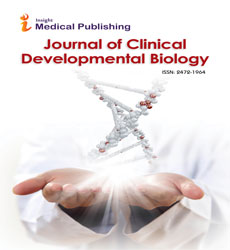Symptoms of Lung Cancer in the Early and Advanced Stages
Rakshitha Kotha
Rakshitha Kotha*
Department of Biochemistry, Osmania University, Hyderabad, Telangana, India
- *Corresponding Author:
- Rakshitha Kotha
Department of Biochemistry
Osmania University, Hyderabad, Telangana, India
Tel: +32-466-90-05-61
E-mail: raksh32311@gmail.com
Received Date: October 06, 2021; Accepted Date: October 20, 2021; Published Date: October 27, 2021
Citation: Rakshitha K (2021) Symptoms of Lung Cancer in the Early and Advanced Stages. J Clin Dev Biol. 6:05.
Visit for more related articles at Journal of Clinical Developmental Biology
Brief Note
Lung cancerAlthough most lung cancers do not show symptoms until they have spread, some persons with early lung cancer do. If you see a doctor as soon as you discover symptoms, your cancer may be detected at an earlier stage, when treatment is more likely to be successful. The majority of these symptoms are caused by something other than lung cancer. Still, if you're experiencing any of these symptoms, you should contact your doctor straight away to determine the source and, if necessary, treat it. The following are the most prevalent symptoms of lung cancer:
• Cough that won't go away or is becoming worse.
• Coughing up blood or mucus that is rust-coloured (spit or phlegm).
• Deep breathing, coughing, or laughing might aggravate chest pain.
• Hoarseness.
• Appetite loss.
• Weight loss.
• Breathing problems.
• Infections that don't go away or keep coming back, such as bronchitis and pneumonia.
• Wheezing has started again.
If lung cancer spreads to other parts of the body, it might lead to the following complications:
• Bone ache (like pain in the back or hips).
• Changes in the nervous system (such as headaches, numbness or weakness in an arm or leg, dizziness, balance issues, or seizures) caused by cancer spread to the brain.
• Jaundice is a yellowing of the skin and eyes caused by cancer spreading to the liver.
• Lymph nodes (collection of immune system cells) in the neck or above the collarbone swell.
• Some lung tumours can result in syndromes, which are collections of symptoms.
Lung cancer early warning signs and symptoms
Because the lungs have few nerve endings, most lung cancers do not show symptoms until the disease has progressed. When lung cancer causes symptoms in its early stages, they can vary from person to person, however the following are frequent lung cancer symptoms:
• A persistent or worsening cough or a change in an existing chronic cough.
• Cough causes bleeding.
• Coughing, laughing, or deep breathing causes pain in the chest, back, or shoulders, which gets worse.
• Shortness of breath that occurs unexpectedly and during normal activity.
Symptoms of advanced lung cancer: Lung cancer in its advanced stages is generally marked by the cancer's spread to other parts of the body. This could have an impact on the bones, liver, or brain. New lung cancer symptoms may appear as other regions of the body are affected, such as:
• Bone ache.
• Facial, arm, or neck swelling.
• Headaches, dizziness, or numbness or weakness in the limbs.
• Jaundice.
• Lumps in the neck or around the collarbone.
Symptoms of lung cancer in women and men: According to the American Cancer Society, lung cancer is the second most prevalent type of cancer diagnosed in both men and women (after skin cancer) (ACS). Men are more likely to develop prostate cancer, while women are more likely to develop breast cancer.
However, when compared to other malignancies, lung cancer is by far the leading cause of death for both men and women. Here's a glance at the numbers.
According to the American Cancer Society, 119,100 men and 116,660 women are predicted to be diagnosed with lung cancer in 2021, with 69,410 men and 62,470 women dying.
According to the American Lung Association, the number of males diagnosed with lung cancer has declined during the last four decades. During the same time span, women's diagnosis rates were on the rise, but have since begun to fall.
Women are more likely than males to be diagnosed at a younger age.
Women who are diagnosed with lung cancer before menopause are more likely to have advanced illness. (They're also more prone to spread and have a worse prognosis).
Select your language of interest to view the total content in your interested language
Open Access Journals
- Aquaculture & Veterinary Science
- Chemistry & Chemical Sciences
- Clinical Sciences
- Engineering
- General Science
- Genetics & Molecular Biology
- Health Care & Nursing
- Immunology & Microbiology
- Materials Science
- Mathematics & Physics
- Medical Sciences
- Neurology & Psychiatry
- Oncology & Cancer Science
- Pharmaceutical Sciences
